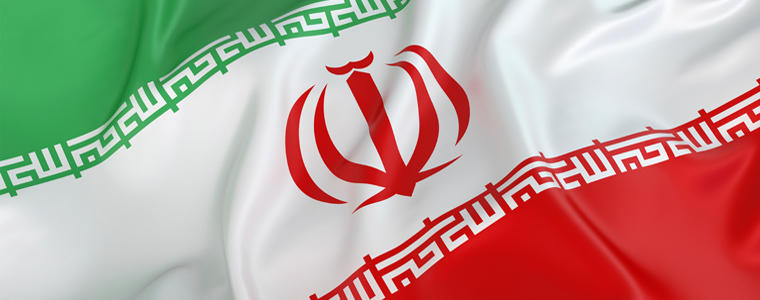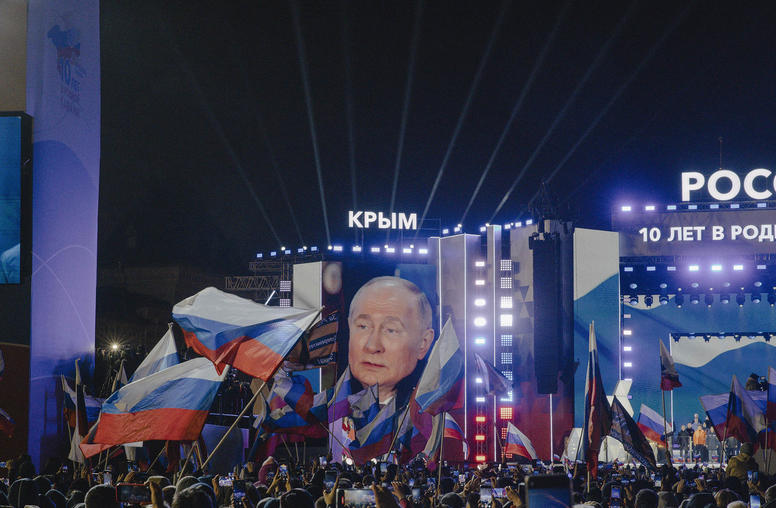From Détente to Meltdown
Will Russian adventurism in Crimea blow up the P5+1 nuclear talks? Iran's hard-liners sure hope so.
As "self-defense forces" storm Ukrainian bases in Crimea and Russian President Vladimir Putin embraces the peninsula's return to the Russian Motherland, Moscow's adventurism is creating a dangerous ripple effect far beyond the cold shores of Crimea. With Russia, the United States, and Europe dancing around the abyss of a new Cold War, Moscow's cooperation in resolving other international disputes will be severely tested. The first casualty of the Crimea debacle could be the ongoing efforts of Russia, the United States, and the other P5+1 countries -- China, Britain, France, and Germany -- to reach a final agreement limiting Iran's nuclear program.

Yet there is much more at stake than the nuclear negotiations. As this week's Vienna talks unfold, and as other rounds follow, lead negotiator Foreign Minister Javad Zarif will also be engaged in a shadow play with his ultra-conservative rivals back in Iran. He knows that the outcome of the nuclear talks will shape the trajectory of Iran's domestic and foreign politics for decades. Indeed, the embryonic effort of Zarif and President Hassan Rouhani to pry open Iran's closed politics largely depends on advancing both the idea and the practice of global détente.
This is precisely why for Tehran's ultra-hard-liners the conflict in Crimea is the best news they've have had in a long time. Their domestic political fortunes rest in part on sustaining Iran's own Cold War with the United States. For the hard-line leaders of Iran's Revolutionary Guard, their much vaunted concept of "resistance" means much more than countering Washington's military power: It requires the assertive presence of other world leaders who -- like Putin -- share a common desire to foster an ideology of cultural, religious, or national prowess in opposition to the United States.
That ideology -- or the resentment that animates it -- has global dimensions. Indeed, events in Crimea have played into the security obsessions of autocratic regimes from Venezuela to China, not just Tehran. The one thing they fear most is a people's uprising: Whatever its color, for these paranoid leaders it represents the twin danger of democracy and U.S.-Western power. The panicked escape of Ukraine's autocratic and clearly pro-Russian former president Viktor Yanukovych in February 2014 suggested that the allure of unruly rebellion might once again spread from Russia's greater backyard to other shores and countries.
Thus it is hardly surprising then that Moscow's actions, which elicited noxious merriment from Russia's ultra-nationalist ideologues, have also been celebrated by Iranian hard-liners. When they hear the likes of Sergei A. Karaganov, a dean of international relations at the Higher School of Economics in Moscow, mocking President Barack Obama or insisting that "confrontation with the West is welcomed ... to cleanse the elite, to organize the nation," Iran's hard-liners can only applaud. Putin's televised and defiant defense of Crimea's annexation -- during which he bitterly complained of the many "insults" Russia has suffered at the hands of the West -- is like music to the ears of those Iranian leaders whose careers depend in part on endless struggle against the United States.
The very opposite is true for those Iranian leaders who have hitched their political careers to advancing political détente, both at home and abroad. For them, the P5+1 negotiations are an essential first step to rolling back the hard-liner's resistance project. For this reason, Zarif will have to work hard to put a firewall between the nuclear talks and the rumblings of a new Cold War. After all, the unity of the P5+1 members is not something sought only by the United States: It's something that Zarif is counting on to advance the negotiations. By contrast, his opponents are surely hoping that new tensions among the P5+1 states will either wreck the talks or produce an alternative nuclear arrangement that earns Moscow's blessing and Washington's ire.
Where do things go from this precarious moment? Thus far, EU negotiators insist that the Crimea crisis has not undermined the unity of the P5+1. But these are still early days in talks that have yet to address the truly tough issues. With U.S.-Russian relations deteriorating, the incentives for Moscow to play nice will only decrease.
Much may ultimately depend on Putin himself. He certainly surprised Western leaders by how quickly he embraced Crimea's succession, but if this event threatens to provoke a bloody civil war in Crimea -- a slim possibility, but not an unthinkable one -- Putin might conclude that he has paid a high price for his embrace of the ultra-nationalists that are now rejoicing in Russia's "victory." Moreover, Putin must remember that other autocratic nations fear the economic and strategic consequences that could ensue from Moscow's actions. China, after all, abstained from the United Nations Security Council vote on Crimea. In light of all this, there is a slim chance that Putin will instruct his negotiators at the P5+1 nuclear talks to show flexibility in the hope that doing so will mitigate Russia's growing international isolation rather than see the talks as another chance to demonstrate Russia's capacity to say nyet.
Still, now that he is riding a rising tide of Russian chauvinism, it is unlikely that Putin worries much about blowback from Moscow's support for Crimea. On the contrary, his actions highlight the growing allure of an intensely anti-Western ethos that is strengthening aspiring autocrats in cities as far flung as Moscow, Cairo, and Sevastopol. Zarif and Rouhani have seen this movie before -- they know how it ends. They are struggling to guide Iran's ship of state to a more rational harbor, one that defends Iran's national interests without indulging in a regressive ideological dualism that divides the world into warring camps. But the seas around them are not as favorable as they seemed some weeks or months ago, when everything suddenly seemed possible. And whether that moment returns may be largely out of their hands.
Reposted with permission from ForeignPolicy.com, Source: “From Détente to Meltdown"


